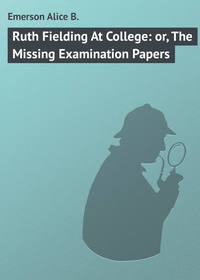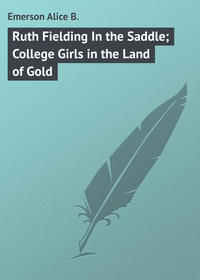 полная версия
полная версияRuth Fielding at Lighthouse Point: or, Nita, the Girl Castaway
“Ouch! stop your pinching!” commanded Jennie, and rose up rather suddenly, for her, to give chase to her tormentor.
The Fox was as quick as a cat, and Heavy was lubberly in her movements. The lighter girl, laughing shrilly, ran forward and vaulted over the low rail that separated the awning-covered upper deck from the unrailed roof of the lower deck forward.
“You’d better come back from there!” Ruth cried, instantly. “It’s wet and slippery.”
The Fox turned on her instantly, her face flushed and her eyes snapping.
“Mind your business, Miss!” she cried, stamping her foot. “I can look out–”
Her foot slipped. Heavy thoughtlessly laughed. None of them really thought of danger save Ruth. But Mary Cox lost her foothold, slid toward the edge of the sloping deck, and the next instant, as the Lanawaxa plunged a little sideways (for the sharp breeze had raised quite a little sea) The Fox shot over the brink of the deck and, with a scream, disappeared feet-first into the lake.
It all happened so quickly that nobody but the group of girls on the forward deck had seen the accident. And Madge, Heavy and Helen were all helpless–so frightened that they could only cry out.
“She can’t swim!” gasped Helen. “She’ll be drowned.”
“The paddle-wheel will hit her!” added Madge.
“Oh! where are those useless boys?” demanded the stout girl. “They’re never around when they could be of use.”
But Ruth said never a word. The emergency appealed to her quite as seriously as it did to her friends. But she knew that if Mary Cox was to be saved they must act at once.
She flung off her cap and light outside coat. She wore only canvas shoes, and easily kicked them off and ran, in her stocking-feet, toward the paddle-box. Onto this she climbed by the short ladder and sprang out upon its top just as The Fox came up after her plunge.
By great good fortune the imperiled girl had been carried beyond the paddles. But the Lanawaxa was steaming swiftly past the girl in the water. Ruth knew very well that Mary Cox could not swim. She was one of the few girls at Briarwood who had been unable to learn that accomplishment, under the school instructor, in the gymnasium pool. Whereas Ruth herself had taken to the art “like a duck to water.”
Mary’s face appeared but for a moment above the surface. Ruth saw it, pale and despairing; then a wave washed over it and the girl disappeared for a second time.
CHAPTER IV
TROUBLE AT THE RED MILL
The screams of the other girls had brought several of the male passengers as well as some of the boat’s crew to the forward deck. Mercy Curtis, who had lain down in a stateroom to rest, drew back the blind and saw Ruth poised on the wheel-box.
“Don’t you do that, Ruth Fielding!” cried the lame girl, who knew instinctively what her friend’s intention was.
But Ruth paid no more attention to her than she had to the other girls. She was wearing a heavy serge skirt, and she knew it would hamper her in the water. With nimble fingers she unfastened this and dropped it upon the deck. Then, without an instant’s hesitation, she sprang far out from the steamer, her body shooting straight down, feet-first, to the water.
Ruth was aware as she shot downward that Tom Cameron was at the rail over her head. The Lanawaxa swept by and he, having run astern, leaned over and shouted to her. She had a glimpse of something swinging out from the rail, too, and dropping after her into the lake, and as the water closed over her head she realized that he had thrown one of the lifebuoys.
But deep as the water was, Ruth had no fear for herself. She loved to swim and the instructor at Briarwood had praised her skill. The only anxiety she had as she sank beneath the surface was for Mary Cox, who had already gone down twice.
She had leaped into the lake near where The Fox had disappeared. Once beneath the surface, Ruth opened her eyes and saw the shadow of somebody in the water ahead. Three strokes brought her within reach of it. She seized Mary Cox by the hair, and although her school fellow was still sinking, Ruth, with sturdy strokes, drew her up to the surface.
What a blessing it was to obtain a draught of pure air! But The Fox was unconscious, and Ruth had to bear her weight up, while treading water, until she could dash the drops from her eyes. There was the lifebuoy not ten yards away. She struck out for it with one hand, while towing Mary with the other. Long before the steamer had been stopped and a boat lowered and manned, Ruth and her burden reached the great ring, and the girls were comparatively safe.
Tom Cameron came in the boat, having forced himself in with the crew, and it was he who hauled Mary Cox over the gunwale, and then aided Ruth into the boat.
“That’s the second time you’ve saved that girl from drowning, Ruth,” he gasped. “The first time was last Fall when you and I hauled her out of the hole in the ice on Triton Lake. And now she would have gone down and stayed down if you hadn’t dived for her. Now! don’t you ever do it again!” concluded the excited lad.
Had Ruth not been so breathless she must have laughed at him; but there really was a serious side to the adventure. Mary Cox did not recover her senses until after they were aboard the steamer. Ruth was taken in hand by a stewardess, undressed and put between blankets, and her clothing dried and made presentable before the steamer docked at the head of the lake.
As Tom Cameron had said, Mary Cox had fallen through the ice early in the previous Winter, and Ruth had aided in rescuing her; The Fox had never even thanked the girl from the Red Mill for such aid. And now Ruth shrank from meeting her and being thanked on this occasion. Ruth had to admit to herself that she looked forward with less pleasure to the visit to the seashore with Heavy because Mary Cox was to be of the party. She could not like The Fox, and she really had ample reason.
The other girls ran into the room where Ruth was and reported when Mary became conscious, and how the doctor said that she would never have come up to the surface again, she had taken so much water into her lungs, had not Ruth grasped her. They had some difficulty in bringing The Fox to her senses.
“And aren’t you the brave one, Ruthie Fielding!” cried Heavy. “Why, Mary Cox owes her life to you–she actually does this time. Before, when you and Tom Cameron helped her out of the water, she acted nasty about it–”
“Hush, Jennie!” commanded Ruth. “Don’t say another word about it. If I had not jumped into the lake after Mary, somebody else would.”
“Pshaw!” cried Heavy, “you can’t get out of it that way. And I’m glad it happened. Now we shall have a nice time at Lighthouse Point, for Mary can’t be anything but fond of you, child!”
Ruth, however, had her doubts. She remained in the stateroom as long as she could after the Lanawaxa docked. When she was dressed and came out on the deck the train that took Heavy and The Fox and the Steeles and Busy Izzy home, had gone. The train to Cheslow started a few minutes later.
“Come on, Miss Heroine!” said Tom, grinning at her as she came out on the deck. “You needn’t be afraid now. Nobody will thank you. I didn’t hear her say a grateful word myself–and I bet you won’t, either!”
Helen said nothing at all about The Fox; but she looked grave. The former president of the Upedes had influenced Helen a great deal during this first year at boarding school. Had Ruth Fielding been a less patient and less faithful chum, Helen and she would have drifted apart. And perhaps an occasional sharp speech from Mercy was what had served more particularly to show Helen how she was drifting. Now the lame girl observed:
“The next time you see Mary Cox fall overboard, Ruth, I hope you’ll let her swallow the whole pond, and walk ashore without your help.”
“If your name is ‘Mercy’ you show none to either your friends or enemies; do you?” returned Ruth, smiling.
The girl from the Red Mill refused to discuss the matter further, and soon had them all talking upon a pleasanter theme. It was evening when they reached Cheslow and Mercy’s father, of course, who was the station agent, and Mr. Cameron, were waiting for them.
The big touring car belonging to the dry-goods merchant was waiting for the young folk, and after they had dropped Mercy Curtis at the little cottage on the by-street, the machine traveled swiftly across the railroad and out into the suburbs of the town. The Red Mill was five miles from the railroad station, while the Camerons’ fine home, “Outlook,” stood some distance beyond.
Before they had gotten out of town, however, the car was held up in front of a big house set some distance back from the road, and before which, on either side of the arched gateway, was a green lamp. The lamps were already lighted and as the Cameron car came purring along the street, with Helen herself under the steering wheel (for she had begged the privilege of running it home) a tall figure came hurrying out of the gateway, signaling them to stop.
“It’s Doctor Davison himself!” cried Ruth, in some excitement.
“And how are all the Sweetbriars?” demanded the good old physician, their staunch friend and confidant. “Ah, Tom, my fine fellow! have they drilled that stoop out of your shoulders?”
“We’re all right, Dr. Davison–and awfully glad to see you,” cried Ruth, leaning out of the tonneau to shake hands with him.
“Ah! here’s the sunshine of the Red Mill–and they’re needing sunshine there, just now, I believe,” said the doctor. “Did you bring my Goody Two-Sticks home all right?”
“She’s all right, Doctor,” Helen assured him. “And so are we–only Ruth’s been in the lake.”
“In Lake Osago?”
“Yes, sir–and it was wet,” Tom told him, grinning.
“I suppose she was trying to find that out,” returned Dr. Davison. “Did you get anything else out of it, Ruthie Fielding?”
“A girl,” replied Ruth, rather tartly.
“Oh-ho! Well, that was something,” began the doctor, when Ruth stopped him with an abrupt question:
“Why do you say that they need me at home, sir?”
“Why–honey–they’re always glad to have you there, I reckon,” said the doctor, slowly. “Uncle Jabez and Aunt Alviry will both be glad to see you–”
“There’s trouble, sir; what is it?” asked Ruth, gravely, leaning out of the car so as to speak into his ear. “There is trouble; isn’t there? What is it?”
“I don’t know that I can exactly tell you, Ruthie,” he replied, with gravity. “But it’s there. You’ll see it.”
“Aunt Alviry–”
“Is all right.”
“Then it’s Uncle Jabez?”
“Yes, my child. It is Uncle Jabez. What it is you will have to find out, I am afraid, for I have not been able to,” said the doctor, in a whisper. “Maybe it is given to you, my dear, to straighten out the tangles at the Red Mill.”
He invited them all down to sample Old Mammy’s cakes and lemonade the first pleasant afternoon, and then the car sped on. But Ruth was silent. What she might find at the Red Mill troubled her.
CHAPTER V
THE TINTACKER MINE
It was too late to more than see the outlines of the mill and connecting buildings as the car rushed down the hill toward the river road, between which and the river itself, and standing on a knoll, the Red Mill was. Ruth could imagine just how it looked–all in dull red paint and clean white trimmings. Miserly as Jabez Potter was about many things, he always kept his property in excellent shape, and the mill and farmhouse, with the adjoining outbuildings, were painted every Spring.
A lamp burned in the kitchen; but all else was dark about the place.
“Don’t look very lively, Ruth,” said Tom. “I don’t believe they expect you.”
But even as he spoke the door opened, and a broad beam of yellow lamplight shot out across the porch and down the path. A little, bent figure was silhouetted in the glow.
“There’s Aunt Alviry!” cried Ruth, in delight. “I know she’s all right.”
“All excepting her back and her bones,” whispered Helen. “Now, Ruthie! don’t you let anything happen to veto our trip to Heavy’s seaside cottage.”
“Oh! don’t suggest such a thing!” cried her brother.
But Ruth ran up the path after bidding them good-night, with her heart fast beating. Dr. Davison’s warning had prepared her for almost any untoward happening.
But Aunt Alvirah only looked delighted to see the girl as Ruth ran into her arms. Aunt Alvirah was a friendless old woman whose latter years would have been spent at the Cheslow Almshouse had not Jabez Potter taken her to keep house for him more than ten years before. Ill-natured people said that the miller had done this to save paying a housekeeper; but in Aunt Alvirah’s opinion it was an instance of Mr. Potter’s kindness of heart.
“You pretty creetur!” cried Aunt Alvirah, hugging Ruth close to her. “And how you’ve growed! What a smart girl you are getting to be! Deary, deary me! how I have longed for you to git back, Ruthie. Come in! Come in! Oh, my back and oh, my bones!” she complained, under her breath, as she hobbled into the house.
“How’s the rheumatics, Aunty?” asked Ruth.
“Just the same, deary. Up one day, and down the next. Allus will be so, I reckon. I’d be too proud to live if I didn’t have my aches and pains–Oh, my back and oh, my bones!” as she lowered herself into her rocker.
“Where’s Uncle Jabez?” cried Ruth.
“Sh!” admonished Aunt Alvirah. “Don’t holler, child. You’ll disturb him.”
“Not sick?” whispered Ruth, in amazement.
“No–o. Not sick o’ body, I reckon, child,” returned Aunt Alvirah.
“What is it, Aunt Alviry? What’s the matter with him?” pursued the girl, anxiously.
“He’s sick o’ soul, I reckon,” whispered the old woman. “Sumpin’s gone wrong with him. You know how Jabez is. It’s money matters.”
“Oh, has he been robbed again?” cried Ruth.
“Sh! not jest like that. Not like what Jasper Parloe did to him. But it’s jest as bad for Jabez, I reckon. Anyway, he takes it jest as hard as he did when his cash-box was lost that time. But you know how close-mouthed he is, Ruthie. He won’t talk about it.”
“About what?” demanded Ruth, earnestly.
Aunt Alvirah rose with difficulty from her chair and, with her usual murmured complaint of “Oh, my back and oh, my bones!” went to the door which led to the passage. Off this passage Uncle Jabez’s room opened. She closed the door and hobbled back to her chair, but halted before sitting down.
“I never thought to ask ye, deary,” she said. “Ye must be very hungry. Ye ain’t had no supper.”
“You sit right down there and keep still,” said Ruth, smiling as she removed her coat. “I guess I can find something to eat.”
“Well, there’s cocoa. You make you a warm drink. There’s plenty of pie and cake–and there’s eggs and ham if you want them.”
“Don’t you fret about me,” repeated Ruth.
“What makes you so mussed up?” demanded Aunt Alvirah, the next moment. “Why, Ruth Fielding! have you been in the water?”
“Yes, ma’am. But you know water doesn’t hurt me.”
“Dear child! how reckless you are! Did you fall in the lake?”
“No, Aunty. I jumped in,” returned the girl, and then told her briefly about her adventure on the Lanawaxa.
“Goodness me! Goodness me!” exclaimed Aunt Alvirah. “Whatever would your uncle say if he knew about it?”
“And what is the matter with Uncle Jabez?” demanded Ruth, sitting down at the end of the table to eat her “bite.” “You haven’t told me that.”
“I ’lowed to do so,” sighed the old woman. “But I don’t want him to hear us a-gossipin’ about it. You know how Jabez is. I dunno as he knows I know what I know–”
“That sounds just like a riddle, Aunt Alvirah!” laughed Ruth.
“And I reckon it is a riddle,” she said. “I only know from piecin’ this, that, and t’other together; but I reckon I fin’ly got it pretty straight about the Tintacker Mine–and your uncle’s lost a power o’ money by it, Ruthie.”
“What’s the Tintacker Mine?” demanded Ruth, in wonder.
“It’s a silver mine. I dunno where it is, ’ceptin’ it’s fur out West and that your uncle put a lot of money into it and he can’t git it out.”
“Why not?”
“’Cause it’s busted, I reckon.”
“The mine’s ‘busted’” repeated the puzzled Ruth.
“Yes. Or so I s’pect. I’ll tell ye how it come about. The feller come along here not long after you went to school last Fall, Ruthie.”
“What fellow?” asked Ruth, trying to get at the meat in the nut, for Aunt Alvirah was very discursive.
“Now, you lemme tell it my own way, Ruthie,” admonished the old woman. “You would better,” and the girl laughed, and nodded. “It was one day when I was sweepin’ the sittin’ room–ye know, what Mercy Curtis had for her bedroom while she was out here last Summer.”
Ruth nodded again encouragingly, and the little old woman went on in her usual rambling way:
“I was a-sweepin’, as I say, and Jabez come by and put his head in at the winder. ‘That’s too hard for ye, Alviry,’ says he. ‘Let the dust be–it ain’t eatin’ nothin’.’ Jest like a man, ye know!
“‘Well,’ says I, ‘if I didn’t sweep onc’t in a while, Jabez, we’d be wadin’ to our boot-tops in dirt.’ Like that, ye know, Ruthie. And he says, ‘They hev things nowadays for suckin’ up the dirt, instead of kickin’ it up that-a-way,’ and with that a voice says right in the yard, ‘You’re right there, Mister. An’ I got one of ’em here to sell ye.’
“There was a young feller in the yard with a funny lookin’ rig-a-ma-jig in his hand, and his hat on the back of his head, and lookin’ jest as busy as a toad that’s swallered a hornet. My! you wouldn’t think that feller had a minnit ter stay, the way he acted. Scurcely had time to sell Jabez one of them ‘Vac-o-jacs,’ as he called ’em.”
“A vacuum cleaner!” exclaimed Ruth.
“That’s something like it. Only it was like a carpet-sweeper, too. I seen pitchers of ’em in the back of a magazine onc’t. I never b’lieved they was for more’n ornament; but that spry young feller come in and worked it for me, and he sucked up the dust out o’ that ingrain carpet till ye couldn’t beat a particle out o’ it with an ox-goad!
“But I didn’t seem ter favor that Vac-o-jac none,” continued Aunt Alvirah. “Ye know how close-grained yer Uncle is. I don’t expect him ter buy no fancy fixin’s for an ol’ creetur like me. But at noon time he come in and set one o’ the machines in the corner.”
“He bought it!” cried Ruth.
“That’s what he done. He says, ‘Alviry, ef it’s any good to ye, there it is! I calkerlate that’s a smart young man. He got five dollars out o’ me easier than I ever got five dollars out of a man in all my days.’
“I tell ye truthful, Ruthie! I can’t use it by myself. It works too hard for anybody that’s got my back and bones. But Ben, he comes in once in a while and works it for me. I reckon your uncle sends him.”
“But, Aunt Alviry!” cried Ruth. “What about the Tintacker Mine? You haven’t told me a thing about that.”
“But I’m a-comin’ to it,” declared the old woman. “It’s all of a piece–that and the Vac-o-jac. I seen the same young feller that sold Jabez the sweeper hangin’ about the mill a good bit. And nights Jabez figgered up his accounts and counted his money till ’way long past midnight sometimes. Bimeby he says to me, one day:
“‘Alviry, that Vac-o-jac works all right; don’t it?’
“I didn’t want to tell him it was hard to work, and it does take up the dirt, so I says ‘Yes.’
“‘Then I reckon I’ll give the boy the benefit of the doubt, and say he’s honest,’ says Jabez.
“I didn’t know what he meant, and I didn’t ask. ’Twouldn’t be my place ter ask Jabez Potter his business–you know that, Ruthie. So I jest watched and in a day or two back come the young sweeper feller again, and we had him to dinner. This was long before Thanksgivin’. They sat at the table after dinner and I heard ’em talking about the mine.”
“Ah-ha!” exclaimed Ruth, with a smile. “Now we come to the mine, do we?”
“I told you it was all of a piece,” said Aunt Alvirah, complacently. “Well, it seemed that the boy’s father–this agent warn’t more than a boy, but maybe he was a sharper, jest the same–the boy’s father and another man found the mine. Prospected for it, did they say?”
“That is probably the word,” agreed Ruth, much interested.
“Well, anyhow, they found it and got out some silver. Then the boy’s father bought out the other man. Then he stopped finding silver in it. And then he died, and left the mine to his folks. But the boy went out there and rummaged around the mine and found that there was still plenty of silver, only it had to be treated–or put through something–a pro–a prospect–”
“Process?” suggested Ruth.
“That’s it, deary. Some process to refine the silver, or git it out of the ore, or something. It was all about chemicals and machinery, and all that. Your Uncle Jabez seemed to understand it, but it was all Dutch to me,” declared Aunt Alvirah.
“Well, what happened?”
“Why,” continued the old woman, “the Tintacker Mine, as the feller called it, couldn’t be made to pay without machinery being bought, and all that. He had to take in a partner, he said. And I jedge your Uncle Jabez bought into the mine. Now, for all I kin hear, there ain’t no mine, or no silver, or no nothin’. Leastwise, the young feller can’t be heard from, and Jabez has lost his money–and a big sum it is, Ruthie. It’s hurt him so that he’s got smaller and smaller than ever. Begrudges the very vittles we have on the table, I believe. I’m afraid, deary, that unless there’s a change he won’t want you to keep on at that school you’re going to, it’s so expensive,” and Aunt Alvirah gathered the startled girl into her arms and rocked her to and fro on her bosom.
“That’s what I was comin’ to, deary,” she sobbed. “I had ter tell ye; he told me I must. Ye can’t go back to Briarwood, Ruthie, when it comes Fall.”
CHAPTER VI
UNCLE JABEZ AT HIS WORST
It was true that Mr. Potter had promised Ruth only one year at school. The miller considered he owed his grand-niece something for finding and restoring to him his cash-box which he had lost, and which contained considerable money and the stocks and bonds in which he had invested. Jabez Potter prided himself on being strictly honest. He was just according to his own notion. He owed Ruth something for what she had done–something more than her “board and keep”–and he had paid the debt. Or, so he considered.
There had been a time when Uncle Jabez seemed to be less miserly. His hard old heart had warmed toward his niece–or, so Ruth believed. And he had taken a deep interest–for him–in Mercy Curtis, the lame girl. Ruth knew that Uncle Jabez and Dr. Davison together had made it possible for Mercy to attend Briarwood Hall. Of course, Uncle Jabez would cut off that charity as well, and the few tears Ruth cried that night after she went to bed were as much for Mercy’s disappointment as for her own.
“But maybe Dr. Davison will assume the entire cost of keeping Mercy at school,” thought the girl of the Red Mill. “Or, perhaps, Mr. Curtis may have paid the debts he contracted while Mercy was so ill, and will be able to help pay her expenses at Briarwood.”
But about herself she could have no such hope. She knew that the cost of her schooling had been considerable. Nor had Uncle Jabez, been niggardly with her about expenditures. He had given her a ten-dollar bill for spending money at the beginning of each half; and twice during the school year had sent her an extra five-dollar bill. Her board and tuition for the year had cost over three hundred dollars; it would cost more the coming year. If Uncle Jabez had actually lost money in this Tintacker Mine Ruth could be sure that he meant what he had left to Aunt Alvirah to tell her. He would not pay for another school year.
But Ruth was a persevering little body and she came of determined folk. She had continued at the district school when the circumstances were much against her. Now, having had a taste of Briarwood for one year, she was the more anxious to keep on for three years more. Besides, there was the vision of college beyond! She knew that if she remained at home, all she could look forward to was to take Aunt Alvirah’s place as her uncle’s housekeeper. She would have no chance to get ahead in life. Life at the Red Mill seemed a very narrow outlook indeed.









